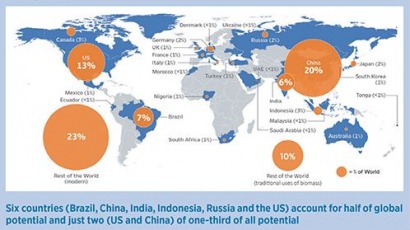
The event, The Renewable Energy Transition, was co-organized by the International Renewable Energy Agency and the Atlantic Council Global Energy Center.
It featured speakers from IRENA, the U.S. Department of State, the U.S. Department of Energy and the American Council on Renewable Energy Strategy.
“The world tends to see energy geopolitics as relations amongst states that are defined by hydrocarbons, but fails to really incorporate the important role and impact that effective, sustainable energy development can have in addressing security and development challenges around the world,” said Richard Morningstar, director of the Atlantic Council Global Energy Center.
Meanwhile Adnan Z. Amin, IRENA's Director-General observed that the US has tremendous renewable energy potential, along with the culture, skills base and financing opportunities needed to become a global centre of renewable energy thought and innovation.
"Our research finds that the U.S. could install significantly higher amounts of renewables – and that it can do so affordably. Even in a country with cheap shale gas like the U.S., renewable energy is still cost competitive and reduces air pollution, enhances energy security, benefits the economy, and mitigates climate change,” Amin said.
According to an IRENA report released earlier this year, the US can increase the use of renewable energy in its energy mix from 7.5 percent in 2010 to 27 percent by 2030.
With current policies in place, the share of renewable energy in the US energy mix will only reach 10 per cent by 2030. REmap 2030 estimates that an annual investment of $86 billion between now and 2030 is required to reach the 27 percent renewables mark – an increase of $38 billion annually beyond a business-as-usual scenario. But, the higher renewable share will result in an annual savings of $30 billion to $140 billion by 2030 when accounting for factors like human health and reduced emissions.
“US energy security, energy sustainability and climate objectives are mutually reinforcing. As such, we are working to promote energy efficiency, conservation and transformation of energy systems. We are encouraging market reforms, such as the elimination of fossil fuel subsidies, that can address overall energy demand,” said Amos Hochstein, special envoy and coordinator for International Energy Affairs at the U.S. Department of State.
The report is part of IRENA’s renewable energy roadmap, REmap 2030, which provides a plan to double the share of renewable energy in the world’s energy mix by 2030 and determines the potential for the U.S. and other countries to scale up renewable energy in the energy system, including power, industry, buildings, and the transport sector.
For additional information:

